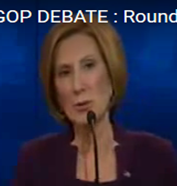Lors du 3e débat des républicains, Carly Fiorina qui met en valeur son passage chez HP, a été interrogé sur ses performances comme CEO de l’entreprise. « Un actionnaire qui a placé un dollar en 1999 quand vous êtes arrivé a perdu la moitié de ses actifs quand vous en êtes partie. Et vous avez été débarqué de l’entreprise par le conseil d’administration. Je me demande si l’on devrait vous embauchez comme président », lui demande la journaliste. Ci-dessous une transcription de l’échange.
BECKY QUICK : Ms. Fiorina, I — I’d like to ask you a question. You are running for president of the United States because of your record running Hewlett-Packard. But the stock market is usually a fair indicator of the performance of a CEO, and the market was not kind to you.
Someone who invested a dollar in your company the day you took office had lost half of the dollar by the day you left. Obviously, you’ve talked in the past about what a difficult time it was for technology companies, but anybody who was following the market knows that your stock was a much worse performer, if you looked at your competitors, if you looked at the overall market.
I just wonder, in terms of all of that — you know, we look back, your board fired you. I just wondered why you think we should hire you now.
FIORINA: You know, the NASDAQ dropped 80 percent — 80 percent — and it took 15 years for the NASDAQ to recover. I was recruited to H.P. to save a company.
It was a company that had grown into a bloated, inept bureaucracy that cost too much and delivered too little to customers and shareholders. It had missed, before I had arrived, expectations for nine quarters in a row.
As an outsider, I tackled H.P.’s entrenched problems head-on. I cut the bureaucracy down to size, re-introduced accountability, focused on service, on innovation, on leading in every market, in every product segment.
And yes, it was a very difficult time. However, we saved 80,000 jobs and we went on to grow to 160,000 jobs, and scores of technology companies literally went out of business — like Gateway — taking all their jobs with them.
The truth is I had to make some tough calls in some tough times. I think, actually, people are looking for that in Washington now. And yes, I was fired over a disagreement in the boardroom. There are politics in the boardroom as well.
And yet the man who led my firing, Tom Perkins, an icon of Silicon Valley, has come out publicly and said, « you know what? We were wrong. She was right. She was a great CEO. She’d be a great president of the United States because the leadership she brought to H.P. is exactly the leadership we need in Washington, D.C.
QUICK: Mrs. Fiorina, it’s interesting that you bring up Mr. Perkins, because he said a lot of very questionable things. Last year, in an interview, he said that he thinks wealthy people should get more votes than poor people.
I think his quote was that, « if you pay zero dollars in taxes, you should get zero votes. If you pay a million dollars, you should get a million votes. » Is this the type of person you want defending you?
FIORINA: Well, this is one of the reasons why Tom Perkins and I had disagreements in the boardroom, Becky. Nevertheless, one of the things that I think people don’t always understand is how accountable a CEO actually is. So you know, I had to report results every 90 days in excruciating detail. I had to answer every single question about every single result and every single projection in public until there were no more questions.
And if I misrepresented those results or those projections in any way, I was held criminally liable. Imagine — imagine — if a politician were held to that standard of account.






 puis
puis